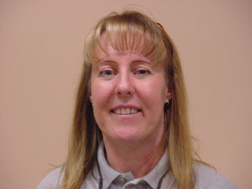"I think people just didn't know how to deal with mixing people in fires."

I was offered a position in Crown King. It was a remote area that was south of Prescott, accessible by a dirt road. This would have been 1975 by now, and it was still a real remote area. It hadn't been well discovered yet, and the district ranger there contacted me and said, "Would you like to come work in Crown King?" again in fire prevention. They had hired another woman, and they basically wanted her to have a roommate. And so Nancy and I were the two women in prevention, although Nancy did work some on a suppression crew, which was extremely rare in those days—at least in that area. Other areas maybe had more women, but our area didn't.
And so anyway, that summer was fantastic. We spent all summer. I was actually allowed to go on fires, although it was really different. I could tell you all kinds of… Nancy and I had a little trailer that we lived in that was parked right next to the ranger's house. The fire crews—mostly men—there were twenty-seven men, they all lived up in what we called Trailer City, up on top of a hill. They could party all night, but Nancy and I had to be in our trailer by ten every night, and we had a bed check by the ranger.
Kern: And the men had none of these [restrictions]?
Zettler: Oh, no. No, no. And I'm sure the ranger was probably kind of—it was new to him, to have women. There was also a woman lookout at the time in Crown King—Jan Wilson. And Jan and her husband lived up at the lookout tower on Towers Mountain. And then her husband was actually my direct supervisor, and he came to Crown King every day. But Nancy and I were the only two women that actually lived and worked with the fire crews. And even though we were one of them, we were definitely segregated from them—not at work. At work everything was pretty equal. You were expected to do physical training and what not. Right after we started working, they actually hired another woman, Linda. So there were actually three of us that were in Crown King that summer. Like I say, it was real equal at work, but outside of work, it was real different, because I'm sure it was different for that ranger to supervise and have women in his work force. And so we did have bed checks at night, we had to be in by ten. I mean, it was no big deal: he'd come and knock on the door, "You girls okay for the night?" and that was that. And so our little trailer was parked right under the window of his house, and we had the horses behind us, the outhouses next to us, the shop in front of us, and the ranger's house here.
… Another one of my favorite stories, but true: When I first started, my cousin—he's a guy—my cousin and I, on the tree-planting crew. When we first started, we were both fresh out of high school, we had no experience whatsoever, and we got our first paychecks, and his check was more than mine. And so I thought, honest mistake. And so I went to our supervisor and my cousin was with me, because we each had our little things—what we called "foot-longs" but they were like the receipt of our check. And we went in and talked with the supervisor, and I said, "I think there was a mistake on my check. My cousin started the same day as I did, but his check's more than mine." And this is what I was told. Now, you've got to remember this is 1973, so it's kind of new, the woman thing. And the supervisor looked at me—his name was Bill—and he looked at me and he said, "Honey, it's because you're a girl, and we're not going to be able to pay you as much as we're going to pay your cousin, because he's a guy, he's going to work harder than you, he's going to put out more, so he's going to get paid more." So I was a GS-1, he was a GS-2, on our pay scale of things. Right? And so it made adamant sense to me at the time, and I just thanked him, "Thank you very much." I mean, I wasn't going to win that battle or change anything, so I just accepted it and went on.
You know, it was like that a lot in those early years. I mean, not the equal pay, but I don't know that it was all a bad thing, as far as the bed check, or as far as people…
I think people just didn't know how to deal with mixing people in fires, or whatever. Later on, more in the late seventies, when you'd go on fires where there were large fire camps, there'd be very few women, maybe five or ten total, out of 500 people. It would be—another interesting thing were like showers. Women's shower hours were usually after ten o'clock at night. And so just when you want to get rest, you're tired by ten o'clock at night. And I remember one night in Montana, I took a shower, and it was probably eleven o'clock at night, and I came out of the shower, and it was really cold and my hair froze. And it was just frozen, walking back to my… We didn't have a tent, we had just a plastic tarp. And my hair froze, and I thought, "Darn, wish I could take a shower like at seven, instead of eleven o'clock at night."
It was just different then—not bad, just different.